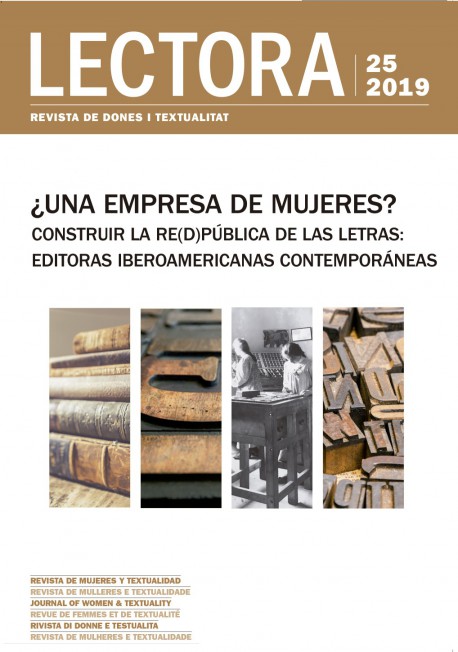A Risky Profession: Being an Editor during Franco's Regime
DOI:
https://doi.org/10.1344/Lectora2019.25.9Keywords:
Esther Tusquets, Beatriz de Moura, Elisenda Nadal, Fotogramas, Francoism, publishing, censorship, cultural memoryAbstract
Since the end of Franco's dictatorship, editorial censorship has been an object of interdisciplinary study that has been incorporating, to the initial analysis of the constitution and nature of censorship, the study of a variety of case studies that are resizing the phenomenon. On the one hand, in the context of memory studies, it is necessary to analyze what effects censorship had on the configuration of cultural memory. On the other hand, censorship has a considerable effect on publishing strategies, both in itself and because it fosters self-censorship and countercensorship. In particular, this article explores the work of women publishers who, in the Barcelona of the 1960s and 1970s, opposed Franco's regime and confronted censorship, as they fought for the revolution of customs, freedom of expression, and the dissemination of culture.
References
Abellán, Manuel L. (1980), Censura y creación literaria en España (1939-1976), Barcelona, Península.
—(1982), “Censura y autocensura en la producción literaria española”, Nuevo Hispanismo, 1: 169-180.
Castellet, José M.ª (1977), “¿Existe hoy una cultura española?”, La cultura bajo el franquismo, Carlos Castilla del Pino et al. (eds.), Barcelona, Ediciones de Bolsillo, 9-19.
Cisquella, Georgina, José Luis Erviti y José A. Sorolla (2002), La represión cultural en el franquismo, Barcelona, Anagrama.
Gubern, Román (1981), La censura: función política y ordenamiento jurídico bajo el franquismo (1936-1975), Barcelona, Península.
Halbwachs, Maurice (1925), Les cadres sociaux de la mémoire, París, Librairie Félix Alca.
—(1950), La mémoire collective, París, Les Presses universitaires de France.
Hirsch, Marianne (2012), The Generation of Postmemory. Writing and Visual Culture After the Holocaust, Nueva York, Columbia University Press.
Larraz, Fernando (2014), Letricidio español. Censura y novela durante el franquismo, Gijón, Trea.
—(2017), “Censura, exilio y canon literario”, Historia Actual Online, 42 (1): 49-56.
Ley 14/1966, de 18 de marzo, de Prensa e Imprenta, Boletín Oficial del Estado. <https://www.boe.es/buscar/pdf/1966/BOE-A-1966-3501-consolidado.pdf>
Lluch-Prats, Javier (2008), “Coacciones censorias: Max Aub y los lectores del régimen franquista”, El Correo de Euclides, 3: 34-53.
Mazquiarán de Rodríguez, Mercedes (2012), “Barcelona y sus divinos”. Una mirada intrusa a la gauche divine a casi medio siglo de distancia, Barcelona, Edicions Bellaterra.
Mengual, Josep (2013), “Esther Tusquets, editora confesa (y la censura)”, Negritas y Cursivas, 12/10/2018. <https://negritasycursivas.wordpress.com/2013/01/25/esther-tusquets-editora-confesa-y-la-censura>
Montejo Gurruchaga, Lucía (2010), Discurso de autora: género y censura en la narrativa española de posguerra, Madrid, UNED.
Moix, Ana M.ª (2002), 24 horas con la Gauche Divine, Barcelona, Lumen.
Moret, Xavier (2002), Tiempo de editores, Barcelona, Destino.
Muñiz Cáliz, Berta (2006), Expedientes de la censura teatral franquista, Madrid, FUE.
Nadal, Elisenda (2010), “Aquellos maravillosos años”, Fotogramas: 38-42.
Neuschäfer, Hans-Jörg (1994), Adiós a la España eterna. La dialéctica de la censura. Novela, teatro y cine bajo el franquismo, Barcelona, Anthropos.
Orquín, Felicidad (ed.) (2007), Conversaciones con editores. En primera persona. Antonio Basanta Reyes (pról.), Madrid, Siruela, El Ojo del Tiempo.
Ricoeur, Paul (2000), La mémoire, l’histoire, l’oubli, París, Éditions de Seuil.
Rojas Claro, Francisco (2006), “Poder, disidencia editorial y cambio cultural en España durante los años 60”, Pasado y Memoria, 5: 59-80.
Ruiz Bautista, Eduardo (2008), Tiempo de censura. La represión editorial durante el franquismo, Gijón, Trea.
Simó Comas, Marta (2015), “Conciencia democrática e industria editorial en los primeros años de la Transición española: la Biblioteca de divulgación política”, Amnis, 14, 12/10/2018. <http://journals.openedition.org/amnis/2634>
Sinova, Justino (1989), La censura de prensa durante el franquismo, Madrid, Espasa Calpe.
Tusquets, Esther (2005), Confesiones de una editora poco mentirosa, Barcelona, RqueR.
—(2009), Confesiones de una vieja dama indigna, Barcelona, Bruguera.
Villamandos, Alberto (2011), El discreto encanto de la subversión. Una crítica cultural de la Gauche Divine, Pamplona, Laetoli.
Zaragoza Ninet, Gora et al. (eds.) (2018), Traducción, género y censura en la literatura y en los medios de comunicación, Granada, Comares.
Downloads
Published
How to Cite
Issue
Section
License
The Author retains ownership of the copyright in this article and grants Lectora: revista de dones i textualitat the rights to print publication of the Article. The work will be available under a Creative Commons Attribution-Noncommercial-No Derivative Works license, by which the article must be credited to the Author and the Journal be credited as first place of publication.
The Author is free to enter in seperate, additional contractual agreements for the non-exclusive distribution of the work as published in this journal (such as institutional repositories or a book), as long as the original publication in Lectora is credited.
The Author is encouraged to post the work online (eg in institutional or thematic repositories, or in their website), as it can lead to productive exchanges as well as to a greater citation of the published work (see The Effect of Open Access).




